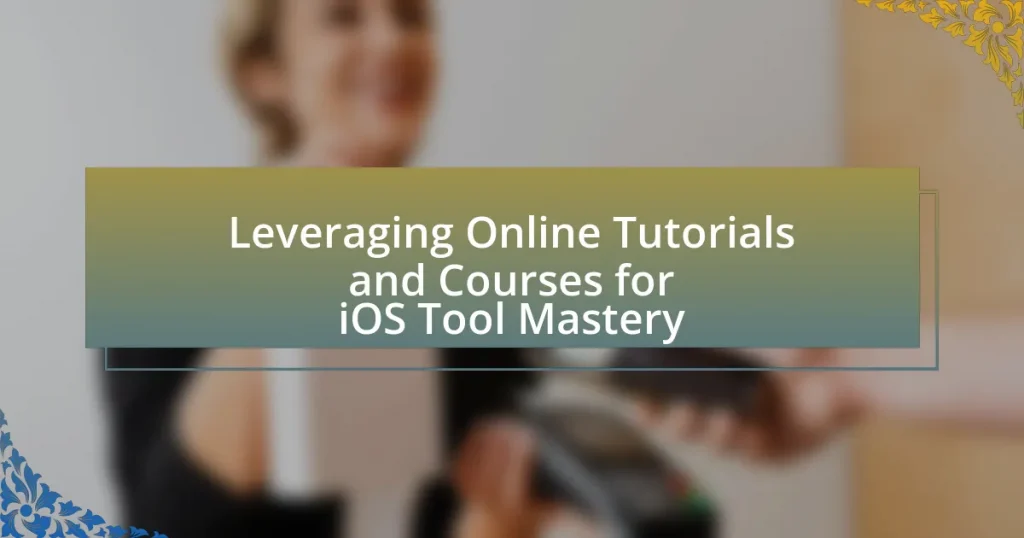Online tutorials and courses for iOS tool mastery are structured educational resources aimed at teaching individuals how to effectively utilize tools and technologies essential for iOS development. These resources encompass various formats, including video lectures, interactive coding exercises, and comprehensive courses available on platforms like Udemy and Coursera, catering to different skill levels. The article explores how these resources enhance learning through structured content, interactive elements, and qualified instructors, while also discussing the importance of mastering iOS tools for career advancement and app development quality. Additionally, it highlights key features to consider when selecting online tutorials, strategies for effective learning, and common challenges learners may face.

What are Online Tutorials and Courses for iOS Tool Mastery?
Online tutorials and courses for iOS tool mastery are structured educational resources designed to teach individuals how to effectively use tools and technologies related to iOS development. These resources often include video lectures, interactive coding exercises, and project-based learning, enabling learners to gain practical skills in areas such as Swift programming, Xcode usage, and app design. Platforms like Udemy, Coursera, and LinkedIn Learning offer a variety of courses that cater to different skill levels, from beginners to advanced developers, ensuring comprehensive coverage of iOS development tools and best practices.
How do these resources enhance learning for iOS tools?
Online tutorials and courses enhance learning for iOS tools by providing structured, accessible content that caters to various skill levels. These resources often include interactive elements, such as quizzes and coding exercises, which reinforce understanding and retention of concepts. For instance, platforms like Udemy and Coursera offer courses designed by industry professionals, ensuring that learners receive up-to-date information and practical skills relevant to current iOS development practices. Additionally, the flexibility of online learning allows users to progress at their own pace, accommodating different learning styles and schedules, which has been shown to improve overall learning outcomes.
What types of online tutorials are available for iOS tool mastery?
Various types of online tutorials are available for iOS tool mastery, including video tutorials, interactive coding platforms, and comprehensive online courses. Video tutorials, often found on platforms like YouTube or Udemy, provide visual demonstrations of iOS development techniques. Interactive coding platforms, such as Codecademy and LeetCode, offer hands-on practice with immediate feedback, enhancing learning through engagement. Comprehensive online courses, available on sites like Coursera and edX, typically cover a wide range of topics in iOS development, often culminating in a certification that validates the learner’s skills. These resources collectively support users in mastering iOS tools effectively.
How do courses differ from tutorials in teaching iOS tools?
Courses provide a structured and comprehensive learning experience for teaching iOS tools, while tutorials offer focused, often shorter, lessons on specific topics. Courses typically cover a wide range of subjects in a systematic manner, often including assessments and projects to reinforce learning, which is supported by educational frameworks like Bloom’s Taxonomy that emphasize progressive skill development. In contrast, tutorials are usually designed for quick learning and may not provide the depth or breadth of knowledge found in courses, making them suitable for immediate, practical tasks rather than long-term mastery. This distinction is evident in platforms like Udemy, where courses often include multiple hours of content and interactive elements, whereas tutorials may consist of brief videos or articles targeting specific features or problems.
Why is mastering iOS tools important for developers?
Mastering iOS tools is crucial for developers because it enhances their ability to create high-quality applications that meet user expectations. Proficiency in tools like Xcode, Swift, and Interface Builder allows developers to streamline their workflow, improve code efficiency, and leverage advanced features of the iOS ecosystem. According to a survey by Stack Overflow, 23.9% of developers reported that mastering specific tools significantly increased their productivity and job satisfaction. This mastery not only leads to better app performance but also positions developers favorably in a competitive job market, where expertise in iOS development is highly sought after.
What career opportunities arise from mastering iOS tools?
Mastering iOS tools opens up various career opportunities, including roles such as iOS Developer, Mobile App Designer, and Software Engineer. These positions are in high demand due to the increasing reliance on mobile applications across industries. According to the Bureau of Labor Statistics, employment for software developers, including those specializing in mobile applications, is projected to grow by 22% from 2020 to 2030, significantly faster than the average for all occupations. Additionally, expertise in iOS tools can lead to freelance opportunities, consulting roles, and positions in tech startups, further expanding career prospects in the mobile technology sector.
How does proficiency in iOS tools impact app development quality?
Proficiency in iOS tools significantly enhances app development quality by enabling developers to utilize advanced features and optimize performance. Skilled developers can leverage tools like Xcode, Swift, and Interface Builder to create more efficient, user-friendly applications. For instance, a study by Stack Overflow in 2021 indicated that developers proficient in Xcode reported a 30% increase in productivity and a 25% reduction in bugs compared to those with limited experience. This proficiency allows for better debugging, streamlined workflows, and adherence to best practices, ultimately resulting in higher-quality applications that meet user expectations and perform reliably across devices.

What are the key features to look for in Online Tutorials and Courses?
Key features to look for in online tutorials and courses include comprehensive content coverage, interactive elements, qualified instructors, and user reviews. Comprehensive content coverage ensures that the course addresses all necessary topics related to iOS tool mastery, allowing learners to gain a full understanding of the subject. Interactive elements, such as quizzes and hands-on projects, enhance engagement and reinforce learning. Qualified instructors with relevant experience provide credibility and effective teaching methods, which are crucial for mastering complex tools. User reviews and ratings offer insights into the course’s effectiveness and learner satisfaction, helping prospective students make informed decisions.
How can learners assess the quality of online tutorials and courses?
Learners can assess the quality of online tutorials and courses by evaluating several key factors, including instructor qualifications, course content, user reviews, and completion rates. Instructor qualifications are crucial; learners should check the background and expertise of the instructor to ensure they have relevant experience in the subject matter. Course content should be comprehensive and up-to-date, covering essential topics and skills needed for iOS tool mastery. User reviews provide insights into the effectiveness and engagement level of the course, with higher ratings typically indicating better quality. Additionally, completion rates can serve as an indicator of course satisfaction; courses with higher completion rates often reflect a more engaging and valuable learning experience.
What role do user reviews and ratings play in selecting resources?
User reviews and ratings significantly influence the selection of resources by providing insights into the quality and effectiveness of online tutorials and courses. These evaluations help potential learners gauge the experiences of others, which can lead to informed decisions. For instance, a study by BrightLocal in 2020 found that 79% of consumers trust online reviews as much as personal recommendations, highlighting the impact of user feedback on resource selection. Additionally, higher ratings often correlate with better learning outcomes, as evidenced by platforms like Udemy, where courses with ratings above 4.5 stars typically attract more enrollments and positive feedback.
How important is the course structure and content depth?
The course structure and content depth are critically important for effective learning in online tutorials and courses, particularly for mastering iOS tools. A well-organized course structure facilitates a logical progression of topics, enabling learners to build on their knowledge incrementally. Research indicates that structured learning environments enhance retention and comprehension, as evidenced by a study published in the Journal of Educational Psychology, which found that students in structured courses performed significantly better than those in unstructured settings. Additionally, content depth ensures that learners gain a comprehensive understanding of the subject matter, which is essential for applying skills in real-world scenarios. In the context of iOS tool mastery, in-depth content allows learners to explore advanced features and best practices, ultimately leading to greater proficiency and confidence in their abilities.
What formats are available for online tutorials and courses?
Online tutorials and courses are available in several formats, including video lectures, written articles, interactive quizzes, and live webinars. Video lectures provide visual and auditory learning experiences, while written articles allow for in-depth reading and reference. Interactive quizzes engage learners by testing their knowledge in real-time, and live webinars offer opportunities for direct interaction with instructors. These formats cater to different learning preferences and enhance the overall educational experience.
How do video tutorials compare to written guides?
Video tutorials provide a more dynamic and engaging learning experience compared to written guides. They allow learners to see processes in action, which can enhance understanding, especially for complex tasks. Research indicates that 65% of people are visual learners, meaning they retain information better when it is presented visually rather than textually. Additionally, video tutorials often include demonstrations and real-time problem-solving, which can be more effective for skill acquisition in practical applications like iOS tool mastery. In contrast, written guides can be more detailed and easier to reference for specific information, but they may lack the immediacy and clarity that visual demonstrations provide.
What are the advantages of interactive courses over traditional formats?
Interactive courses offer enhanced engagement and personalized learning experiences compared to traditional formats. These courses often incorporate multimedia elements, real-time feedback, and collaborative activities, which cater to diverse learning styles and keep learners actively involved. Research indicates that interactive learning can improve retention rates by up to 75%, as learners are more likely to remember information when they actively participate in the learning process. Additionally, interactive courses allow for immediate application of knowledge through practical exercises, which reinforces understanding and skill mastery, particularly beneficial in technical fields like iOS tool mastery.

How can learners effectively leverage Online Tutorials and Courses?
Learners can effectively leverage online tutorials and courses by actively engaging with the content, setting specific learning goals, and applying the knowledge through practical projects. Engaging with the content involves taking notes, participating in discussions, and completing exercises, which enhances retention and understanding. Setting specific learning goals helps learners focus on what they want to achieve, making the learning process more structured and efficient. Applying knowledge through practical projects reinforces learning and allows learners to see real-world applications of the skills acquired. Research indicates that active learning strategies can improve retention rates by up to 50%, demonstrating the effectiveness of these methods in online education.
What strategies can enhance the learning experience?
Utilizing interactive online tutorials and structured courses significantly enhances the learning experience. These strategies promote engagement through hands-on practice, immediate feedback, and a clear learning path. Research indicates that interactive elements in online learning can increase retention rates by up to 60%, as learners actively participate rather than passively consume information. Additionally, structured courses often provide a comprehensive curriculum that builds knowledge progressively, which is essential for mastering complex tools like those used in iOS development.
How can setting specific goals improve mastery of iOS tools?
Setting specific goals enhances mastery of iOS tools by providing clear direction and measurable outcomes. When learners establish precise objectives, such as completing a specific online course or mastering a particular feature of an iOS tool, they can focus their efforts and track their progress effectively. Research indicates that goal-setting increases motivation and engagement, leading to improved learning outcomes. For instance, a study published in the Journal of Educational Psychology found that students who set specific goals performed better than those with vague or no goals, demonstrating the effectiveness of targeted learning strategies in mastering complex tools like those in the iOS ecosystem.
What role does practice play in mastering iOS tools through online resources?
Practice is essential in mastering iOS tools through online resources, as it reinforces learning and enhances skill retention. Engaging in hands-on exercises allows learners to apply theoretical knowledge gained from tutorials and courses, leading to a deeper understanding of the tools. Research indicates that active practice can improve proficiency; for instance, a study published in the Journal of Educational Psychology found that students who practiced skills regularly demonstrated significantly higher performance levels compared to those who only engaged in passive learning. Therefore, consistent practice not only solidifies the concepts learned but also builds confidence in using iOS tools effectively.
What common challenges do learners face when using online resources?
Learners face several common challenges when using online resources, including information overload, lack of engagement, and difficulty in assessing credibility. Information overload occurs due to the vast amount of content available, making it hard for learners to filter relevant material. A study by the Pew Research Center found that 70% of online learners feel overwhelmed by the amount of information they encounter. Lack of engagement is another issue, as many online resources do not provide interactive elements, leading to decreased motivation and retention. Additionally, assessing the credibility of sources can be challenging, with a significant number of learners struggling to distinguish between reliable and unreliable information. This challenge is highlighted by a report from the Stanford History Education Group, which revealed that 82% of middle school students could not distinguish between a sponsored post and a news article.
How can learners overcome distractions while studying online?
Learners can overcome distractions while studying online by creating a dedicated study environment that minimizes interruptions. This involves selecting a quiet space, using noise-canceling headphones, and turning off notifications on devices. Research indicates that a well-defined study area can enhance focus and retention, as demonstrated in a study by the University of Illinois, which found that students who studied in distraction-free environments performed better academically. Additionally, setting specific study times and using techniques like the Pomodoro Technique can help maintain concentration and manage time effectively.
What are effective methods for retaining information from tutorials?
Effective methods for retaining information from tutorials include active engagement, spaced repetition, and summarization. Active engagement, such as taking notes or asking questions during the tutorial, enhances understanding and memory retention. Spaced repetition, which involves reviewing material at increasing intervals, has been shown to improve long-term retention, as supported by research from Cepeda et al. (2006) in “Distributed Practice in Verbal Memory Tasks: A Review and Meta-Analysis.” Summarization, where learners condense information into their own words, reinforces comprehension and recall. These methods collectively contribute to a more effective learning experience in online tutorials.
What are some best practices for mastering iOS tools through online learning?
To master iOS tools through online learning, engage in structured courses that offer hands-on projects and real-world applications. Structured courses, such as those on platforms like Udemy or Coursera, provide a comprehensive curriculum that covers essential concepts and practical skills. Engaging in hands-on projects reinforces learning by allowing users to apply theoretical knowledge in practical scenarios, which is crucial for mastering iOS development. Additionally, participating in online communities, such as forums or social media groups, facilitates knowledge sharing and problem-solving with peers, enhancing the learning experience. Research indicates that active participation in learning communities can significantly improve retention and understanding of complex subjects.
How can learners create a structured study plan for iOS tool mastery?
Learners can create a structured study plan for iOS tool mastery by defining clear learning objectives, selecting relevant online tutorials and courses, and scheduling consistent study sessions. First, learners should identify specific skills or tools they want to master, such as Swift programming or Xcode usage. Next, they can choose high-quality resources, such as Apple’s official documentation, Udemy courses, or free platforms like Codecademy, which provide structured content. Finally, learners should allocate dedicated time each week for study, ensuring they balance theory with practical application through projects or exercises. This approach is supported by research indicating that structured learning enhances retention and skill acquisition, as seen in studies on educational methodologies.
What resources can supplement online tutorials for deeper understanding?
Books and academic papers can supplement online tutorials for deeper understanding. For instance, reading “iOS Programming: The Big Nerd Ranch Guide” provides comprehensive insights into iOS development concepts that may not be fully covered in online tutorials. Additionally, engaging with forums like Stack Overflow allows learners to ask specific questions and receive expert advice, enhancing their grasp of complex topics. Research indicates that combining multiple learning resources, such as books and community discussions, leads to improved retention and application of knowledge in practical scenarios.











